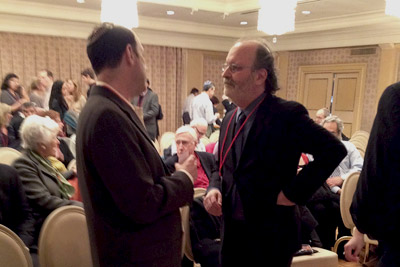Interaction with Islam profoundly transformed Judaism
By Claire Lambrecht

A crowd of 115 alumni and friends gathered at the Park Avenue Synagogue in New York City March 15 to hear Cornell Professor Ross Brann, acting chair of the Department of Near Eastern Studies, on the topic "When Islam Enriched Judaism."
"We supposedly live in an era of culture wars," began Brann, the Milton R. Konvitz Professor of Judeo-Islamic Studies at Cornell. "There is a notion that this paradigm was set at the end of the 20th century and that it will dominate the 21st century."
The idea of inherent cultural antagonism, said Brann, "presents us with a sense that we're handcuffed. That what always was is what is now and will always be, and no matter what choices we make as political actors or as human beings, there is not really anything one can do to avoid conflict."
This paradigm is particularly troubling, Brann said, because Judaism and Islam have a long and rich history of interaction and learning from one another.
In the classical age of Islam, 800-1200 CE, a majority of Jews lived in Arabic-speaking Middle Eastern lands. It was a period of great progress and achievement for the Jewish people, Brann said.
"Many think that Jewish urbanization began with modernity, but the Jews under Islam were transformed from the agrarian people described in the Babylonian Talmud into a people that we recognize today: an urban people," he said.
In addition to their robust economic activity across all the professions under the orbit of Islam during this period, Jews developed the first systematic grammars of the Hebrew language, the first rational commentaries on text of the Hebrew Bible, the first systematic codes of Jewish law and the first works of rational theology. Each of these advancements were predicated upon, and modeled after, their Arabo-Islamic models, Brann said.
During the classical age of Islam, the practice of sharing best practices was not considered taboo, Brann added. "Moses Maimonides, by virtue of living in two linguistic worlds at once, even while he was a Jew and the greatest rabbinic figure of his age," Brann said, "was perfectly comfortable understanding that he was in a profoundly deep conversation with Islam through the Arabic language."
Maimonides appreciated the commonalities, Brann said. He wrote, "And as for the Arabic and Hebrew languages, all who know both of them agree that they are one language without a doubt."
This openness, Brann said, offers a lesson for the present moment. "Language," he said, "is a key to opening cultural conversation and establishing a trans-cultural connection."
For Brann, engaging in these cross-cultural conversations like Thursday's event is a hallmark of his career. In addition to being named a Stephen H. Weiss Presidential fellow, Brann spent six years as dean of the Alice H. Cook House, where he and his wife, Eileen Yagoda, lived.
"Ross really embodies the best of Cornell faculty," said Charlie Temel '75, who served as a Cornell Hillel committee chair of the event. "He has encouraged his students to try new paths, to explore new things, and in such ways he has not only enriched their lives, but their communities."
The event was sponsored by Cornell Hillel.
Claire Lambrecht '06 is a freelance writer in New York City.
Media Contact
Get Cornell news delivered right to your inbox.
Subscribe